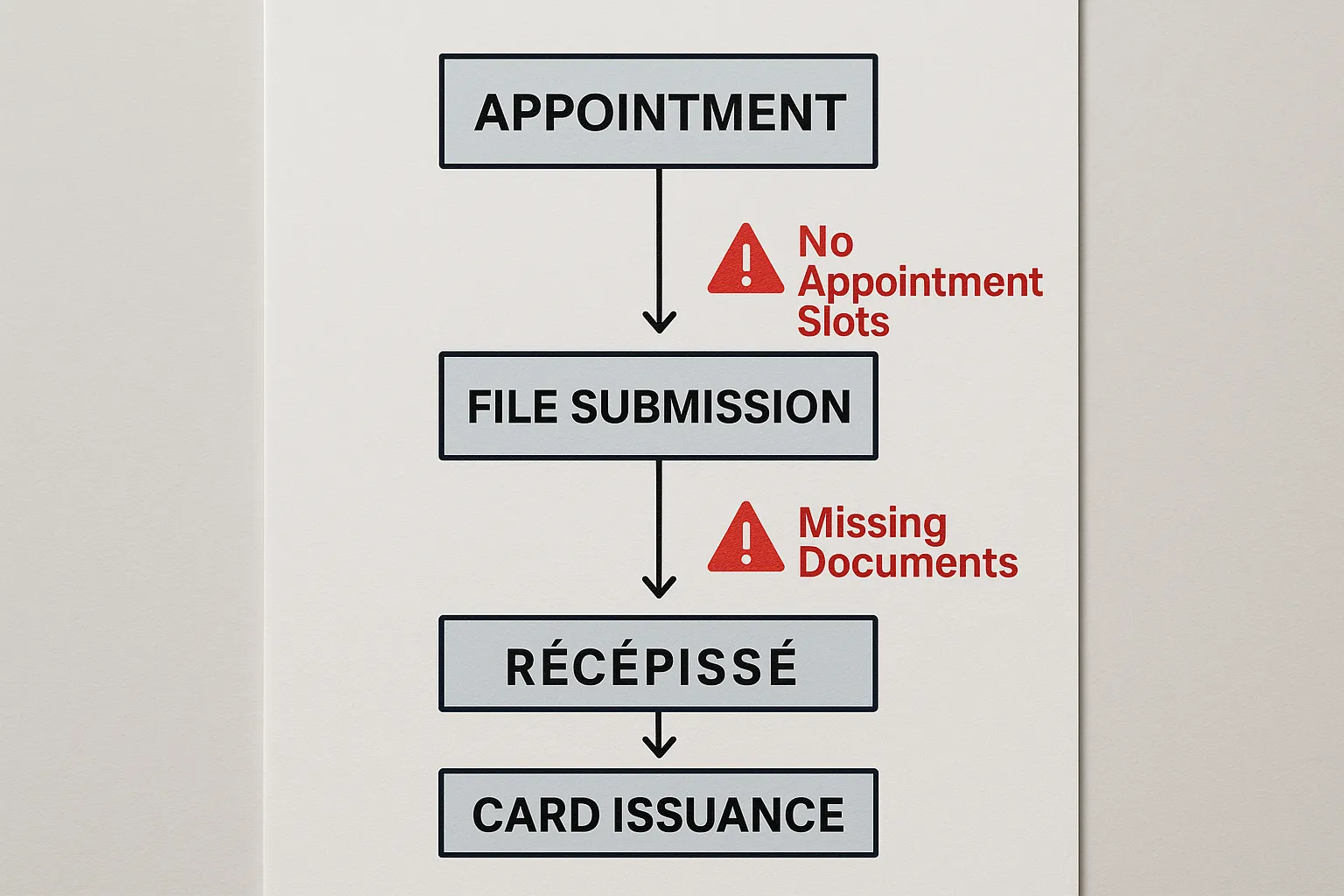Carte de Séjour for EU Family Members: Application Guide and Common Snags

Moving to France with Your EU Partner? Read This First
If you are the spouse, child, or dependent parent of an EU or EEA citizen who plans to settle in France for more than three months, French law says you are entitled to a carte de séjour “membre de famille d’un citoyen de l’Union”. In practice, however, getting that little plastic card can feel like running an obstacle course: appointments vanish in seconds, document lists differ from one prefecture to another, and small mistakes can push you back to square one.
This guide walks you through the 2025 rules, step-by-step requirements, and the most common snags applicants report to ImmiFrance. By the end, you will know exactly what to prepare and how to react if the prefecture’s answer is “incomplete file — come back later”.
1. Legal Basis and Key Benefits
- Directive 2004/38/EC (often called the Free Movement Directive) requires France to facilitate residence for qualifying family members of EU citizens.
- Articles L421-1 to L421-22 of the French immigration code (CESEDA) transpose those rights into national law.
With a valid EU-family carte de séjour you can:
- Live and work in France without needing a separate work permit.
- Travel in and out of the Schengen Area with fewer checks.
- After five continuous years, apply for a permanent 10-year card or even French citizenship if you meet integration criteria.
2. Who Qualifies in 2025?
| Relationship | Age or Status Condition | Must Be Dependent? |
|---|---|---|
| Spouse (married) | Marriage must be legally recognized in France | No |
| Registered partner (PACS) | Must prove durable relationship and joint residence | Depends on prefecture |
| Unmarried partner (durable relationship) | Documentary proof of at least 12 months cohabitation | Yes – treated case-by-case |
| Child of EU citizen | Under 21 or financially dependent | No if <21 |
| Step-child | Same as above plus consent from other biological parent | – |
| Dependent parent or grandparent of EU citizen | Any age | Yes |
| Dependent parent of EU spouse | Allowed if financial dependence proved | Yes |
Note: Since January 2024, UK nationals are no longer considered “EU citizens” for this procedure. Their non-EU family members must apply under the Withdrawal Agreement rules.
3. Required Documents Checklist
Every prefecture publishes its own PDF, but the core list is harmonized by the Ministry of Interior. Gather originals and one set of copies:
| Document | Tips to Avoid Refusal |
|---|---|
| Passport of applicant | Full-page copy, including blank pages with stamps |
| Passport or national ID of EU citizen | Must be valid for duration of stay |
| Proof of family link (marriage certificate, birth certificate, PACS) | Provide certified translation if not in French |
| Proof EU citizen has moved to France | Lease, property deed, or recent utility bill |
| Proof of sufficient resources | Last 3 payslips or work contract of EU citizen; entrepreneurs add K-bis extract |
| Proof of comprehensive health insurance | EU citizen working in France covers family via Assurance Maladie; otherwise, private policy or EHIC plus attestation |
| Proof of applicant’s entry date into France | Entry stamp, transport ticket, or sworn statement if arriving from Schengen |
| Three standard ID photos | 35×45 mm, neutral background |
| Cerfa form n° 14597*03 | Fill out in blue ink, no digital signature |
ImmiFrance tracking data shows that 84 % of file rejections in 2024 were due to missing resource proof or outdated translations.
4. The Application Process Explained
-
Book an appointment online
- Most prefectures now use the Démarches Simplifiées portal. Slots open 30 to 60 days in advance, typically at 8:30 AM on weekdays.
- No slots? Take screenshots of the unavailable calendar. They can help defend your case if you later receive an OQTF (obligation to leave France) for “no residence title”.
-
Prepare two physical files
- One complete set for the officer.
- One identical set for your records, stamped and dated at submission.
-
Attend the interview
- Both you and the EU citizen must be present unless exempted. Bring originals for inspection.
- Fingerprints and a digital photo are collected on site.
-
Receive the récépissé
- If the file is accepted, you get a 6-month temporary receipt allowing you to work.
- If documents are missing, you will receive a lettre de complément with 30 days to supply the items.
-
Pick up the carte de séjour
- Average processing time in 2025 is 7 to 10 weeks, according to the Ministry’s June 2025 dashboard.
- A 269 € tax stamp is due upon issuance.

5. Common Snags and How to Fix Them
-
Impossible to get an appointment
- Email the prefecture’s dedicated EU family address with proof of attempts.
- Send a registered letter (LRAR) requesting an appointment. Prefectures must answer within one month per Article R421-19 CESEDA.
-
Officer demands “proof of language level”
- Politely cite Article L421-5: no integration assessment is required for EU family cards. Provide a printed copy.
-
Questioning the financial resources
- The threshold equals the French minimum wage net (1 460 €/month in 2025). If the EU citizen is job-seeking, show savings statements covering six months.
-
PACS or unmarried partners treated as tourists
- Produce joint bank statements, joint lease, and photos proving at least one year of shared life. If refused, request a written decision to appeal.
-
Spouse entered France without visa
- Under Article 5(4) of Directive 2004/38/EC, a visa may be obtained at the border or afterwards. Prefectures cannot refuse the application solely on that ground.
-
Prefecture issues a short-stay “visitor” sticker instead
- File a complaint to the Défenseur des droits and seek interim relief (référé) at the administrative tribunal.

6. Renewals and Upgrades
- First renewal: apply two months before expiry. Bring updated proof of cohabitation and resources.
- Permanent 10-year card: available after five years of continuous residence alongside the EU citizen.
- Switch to carte de résident (non-EU route): possible if the EU citizen leaves France but you have already spent five years on French soil.
Failure to renew on time can trigger an OQTF. If this happens, contact a specialized lawyer immediately. ImmiFrance can put you in touch within 24 hours through our prefecture-appointment assistance page.
7. Costs and Timelines at a Glance
| Item | 2025 Fee | Average Delay |
|---|---|---|
| Tax stamp at card pickup | 269 € | – |
| Certified translation (per page) | 30–45 € | 2–3 days |
| Apostille (if required) | 20 € | 1 week |
| Private health insurance (if needed) | 40–90 €/month | Immediate |
| Prefecture processing | – | 7–10 weeks |
Source: Ministry of Interior data, June 2025; market averages compiled by ImmiFrance network translators.
8. How ImmiFrance Can Help
- Document pre-check: an immigration advisor reviews scans of your file and flags missing items within 48 hours.
- Appointment monitoring: our bot tracks slot releases across 74 prefectures and sends a real-time SMS when a seat opens.
- Legal intervention: if your file is rejected or you receive an OQTF, we connect you to a vetted lawyer who can file an emergency appeal.
- Case tracking dashboard: follow each milestone, upload additional documents securely, and chat with your assigned expert.
ImmiFrance clients obtained their first EU-family carte de séjour in 93 % of cases on the first try in 2024, compared with the national average of 76 % reported by the Défenseur des droits.
For personalized guidance, visit our residence permit section or start your application directly from the contact page.
Key Takeaways
- The right to a carte de séjour for EU family members is grounded in both EU and French law.
- Perfect documentation and early appointment booking are the two biggest success factors.
- Common snags include resource proof, appointment scarcity, and misunderstandings about partner status—each has a legal remedy.
- Professional assistance can shave weeks off processing and prevent costly refusals.
Moving to France with your EU partner should be exciting, not exhausting. Start organized, know your rights, and do not hesitate to leverage expert help when the prefecture maze seems endless.
